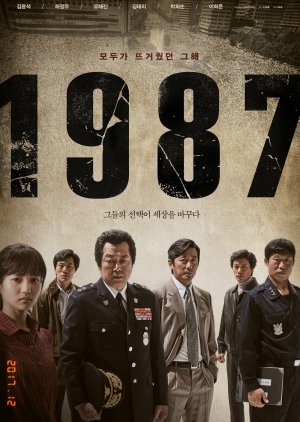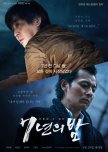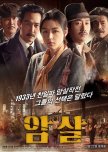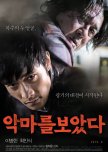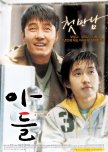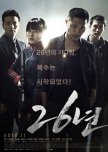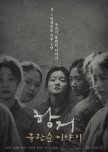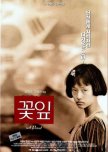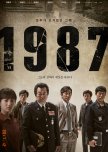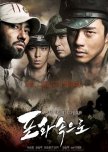
This review may contain spoilers
Quiet resistance becomes power—ordinary lives spark change in this gripping historical drama
South Korea, 1987: a country under the control of an authoritarian regime, where freedom of expression is suppressed and political activists are brutally persecuted. Amidst this repressive atmosphere unfolds the KMovie “1987: When the Day Comes”—a political thriller that not only illuminates the events surrounding the death of student activist Park Jong-chul, but also showcases the collective power of a society rising up against injustice.Director Jang Joon-hwan weaves a dense web of dramatic force, historical accuracy, and emotional depth—creating far more than just a political drama. He delivers a silent outcry for democracy, civic courage, and collective remembrance. The story is staged like a relay race: the narrative jumps between journalists, prosecutors, students, and prison guards, showing how many small steps ultimately lead to a great change. The film for me is not only a cinematic masterpiece but also an emotional appeal to conscience.
Rather than following a classic hero, the film presents a mosaic of individuals who make great change possible through small decisions. Camera work and editing are precise, almost documentary-like, yet never lose sight of emotional resonance. Especially impressive is how the screenplay transforms seemingly incidental encounters—such as between a prison guard and his niece—into milestones of a historic awakening.
Instead of drawing a clear moral line, the film presents ambivalence: journalists who walk a tightrope; a prison guard yielding to his conscience; a student who moves from cautious skepticism to resolute conviction; an official who refuses to look away at a decisive moment. Their actions are subtle, their words sometimes hesitant—and it is precisely this that creates a realism far beyond mere dramatic staging. It is the “little” people—the inconspicuous, sometimes nameless figures—who give the film its depth and authenticity.
These figures serve as moral compasses in a system that punishes any deviation. Their choices are not loud heroic deeds, but quiet acts of resistance that pave the way for change. While the great battles move the audience, it is these moments that linger—because they show how democracy begins in everyday life: through the courage to embrace humanity.
In this, “1987” achieves something rare: the film not only celebrates the victors of history, but honors those who stood in the shadows—without whose actions no light would have illuminated the dark corridors of the past.
-----------------------------------------------------------------------
SIDENOTE:
THE FRAGILE SEEDLING OF ‘DEMOCRACY’ and SOUTH KOREA IN 1987
South Korea in 1987 stood at a crossroads: The military leadership under Chun Doo-hwan clung to power, while the populace—above all, students and intellectuals—had been rising up with growing courage for years. The brutal torture and murder of student Park Jong-chul became a turning point. The subsequent response, the June Uprising, initiated the transition to democracy.
South Korea's path to democracy is remarkable for its dynamism and symbolic power – especially in the pivotal role played by ordinary people. While other countries liberalized slowly, the Korean people fought for their freedoms against a heavily armed and determined regime. The role of students, church networks, and the media was central—an example of how civil society can become the driving force for change.
The film does not depict these developments as a triumphant victory march, but as a difficult, fragile path on which many risked their safety, freedom, and even their lives. This realism makes the story tangible—and relevant.
What makes “1987” so explosive, too, is its current relevance. The film is not a nostalgic project—it flickers as a warning signal in times when democracies around the world are under pressure. Even today, we witness how the erosion of democratic institutions often happens gradually: through indifference, disinformation, and complacency.
How easily we forget that democracy is not a given—that it must be actively lived and defended. “1987” reminds us that you don’t need a “big moment” to take a stand—it is everyday courage that counts.
“1987: When the Day Comes” thus for me is more than a moving film—it is an invitation not only to discover South Korea’s past, but also to question our own present. What are we doing today?
Was this review helpful to you?

What is TRUE PATRIOTISM?
The influence the PRESS wields exhibits the tenacity that TRUTH and JUSTICE might TRIUMPH in a civil society. The film reminded me of The Pentagon Papers (2003) about the U.S. involvement in the Vietnam War. Seismic social changes do not come about immediately as negative sentiment must first build throughout the years, and citizens grow agitated by their public officials.Brief History
Korean History 101, Democracy embedded itself in South Korea culture years before Park Chung-hee assassination occurred on October 26, 1979, rejuvenating the democratic movements in South Korea, silenced initially under Park's Dictatorship regime. May 18, 1980, Gwangju Uprising was the beginning of a more unpopular oppressive military regime under Chun Doo-hwan leading up to the June 1987 Democratic Movement changing the fate of a Nation's political landscape.
---------------------------------------------------------------------------------------------------------------------
Director Jang Joon Hwan's documentary touch paints the perfect image of South Korea, the repression of civil discord within the year 1987. The viewer concentrates on watching the film conveying a story with a palpable tempo, to pull it off with suspense, to appeal to emotion, and to entertain. It is a film that wept tears of human horror, moved by the courage of those who pursue the truth. Most people will wallow in this film, but few people will rebuff it and say it is biased.
With the word "Communist" by a single word, the whole state persecutes ordinary people. On the contrary, the same persecution was happening in a socialist country. When a nation uses its "enemies" to inflame its people, it is better to be careful before the persecution. Jang Joon Hwan's micromanaged the word "Conscience" introspectively. What is TRUE PATRIOTISM?
In my book, Kim Yoon Seok pitches in an Oscar-worthy performance with his cold-eyed gaze. In the first encounter with KYS's character, the audience perceives the warped and distorted view of PATRIOTISM through his mindset. Ha Jung Woo's role may not have had the screentime he merited, but what an energetic rendition of a Prosecutor's unwillingness to bend to his Superiors wishes.
Kim Tae Ri depicting a university student swallowed up in the Democratic Revolution contributed to the turbulent climate of the period. Lee Hee Joon's portrayal of Reporter Yoon furnishes tenacious energy to his purpose ductile like iron. It is such a story that the audience thinks of the nameless predecessors who fought to protect the rights of the people who are today, as most actors depict fictional characters. All the actors do a marvelous job except I would have liked to see more from the people's side. The one complaint I have about this film the music and shouting sometimes drown out the dialogue between the actors. Other than that, unheralded film.
South Korea attained what the 1989 Tiananmen Square protesters could not Democracy with free and fair Presidential Elections not favored for one party or one candidate. Corruption will exist in politics for eternity, but the right to choose your elected officials' and hold them accountable is a blessing. The tyranny of the regime silently; it becomes a problematic situation.
I think back on the 2016-2017 Candlelight Revolution Movement against the unpopular President Park Geun-Hye (2013-2017), the daughter of dictator Park Chung-hee, eventually impeached for the corruption of bribery sentenced to 25 years in prison. Democratic values have wavered, but Standing Up for Truth and Justice has not fluctuated since 1987.
Final Rating: 8.59/10
Acting: 9.60/10
Story: 8.98/10
Rewatch Value:
I have watched this film three times, so it is rewatchable for anyone able to stomach the subject matter - based on True events.
Was this review helpful to you?

This review may contain spoilers
A captivating and moving movie about the modern history of the South Korean democracy movement. Difficult to comprehend that this movie is not fictional, and that most of sequenced events in this film happened in real life. I was initially told to watch this from my Korean history teacher in university, but I took interest in it myself. As an Eastern European, I have learned that the pro-democracy movements in the 1980s were based on sacrifice and the will of the people not only in Korea, but the rest of the world at specific decade as well. The actors have portrayed true emotions, and there were so many storylines of various characters intertwined with harmony. Even as someone not Korean, it was very easy to follow the storyline and to see what the good and evil were. Every minor detail, from set design to props, had mesmerised me. I did shed a few tears, but this was a great learning experience, and a very interesting movie to watch! Was this review helpful to you?

''Not being able to speak at all. That is hell''
''1987'' is an excellent movie that makes you feel angry and frustrated most of the time. It shows the cruel world we live in and how trashy politics can be. After I finished it, I informed myself about the June Struggle and it's insane how well ''1987'' shows what really happened.The movie is definitely more of a slow-paced one and it is kind of complicated because there are qiute a lot of characters. But because the events were explained very well and the storytelling was nice, it was not hard to follow and you don't really get bored. I wholeheartedly enjoyed each moment of it, the dialogues were written very well and the cinematography was out of this world. It's my first time seeing a movie by Director Jang Joon Hwan but I must say I'm very impressed. The cast was also brilliant!
The ending was breathtaking. Honestly, one of the best movie endings ever. Very sad, very emotional and meaningful. Definitely the best moment of the movie.
The only problem I had with this movie is actually very simple, but it bugs me. Every sound was so loud while the characters' voices were too quiet. I contstantly had to adjust the volume and it made my watching quite unpleasant.
So overall, the ''1987'' is very powerful movie that won't be easy to forget. The feeling you get from will be hard to get erased.
Was this review helpful to you?

Remember 1987
This movie is based on actual events called June Democratic Uprising in Korea which happened in 1987.It all started when a college student was tortured and killed by anti-communist group and they tried to conceal his death.
I love how the director was able to tell the story through different people, starting from the prosecutor who demanded autopsy, to jail guard who passed on info to the opposition, the reporter who tried to reveal the truth to the public, and to the students who bravely rallied against the government.
Not for the faint hearted. It’s moving, horrifying and inspiring. The extra romance between the two college students slightly felt out of place but the end made up for it.
Rating: 8.5
Was this review helpful to you?

Excessively over-dramatized
1987: When the Day Comes directed by Jang Joon-hwan and written by Kim Kyung-chan is a well - meaning fictional attempt to tell the story of events leading up to the real life 1987 June Democratic Uprising in Korea. This was triggered by the death of a student protester during police interrogation which the authorities conspire to cover up. The movie starts well when focusing on the actions of the honest medical examiner and prosecutor who both are disinclined to look the other way and authorise a fake mock-up of the cause of death to cardiac arrest.However the story line flow falters when the narrative spreads outwards to include the perspectives of police, both good and bad, journalists trying to ascertain the facts of the case, other university students, prison guards, catholic priests, people on the street and established political authorities. There simply are too many characters involved on which to concentrate one's attention. Director Kim would have been well - advised to just focus on a few key personalities instead of casting his net so far and wide, albeit with the worthy aim of reflecting the general population's demand for democratic reform.
The movie is successful though at depicting the fact that South Korea, barely a year before the 1988 Seoul Olympics was for all intensive purposes, a dictatorship, something many modern Westerners may fail to realise, aware only of the vibrant democracy that is the current Sixth Republic of South Korea. In a long roundabout fashion, 1987 does manage to reflect its genesis.
Was this review helpful to you?

Why Koreans intensely guard their democracy
This film is based on a true story, a fight between the most unlikely heroes against a monster that is dictatorship and its vast network of power-hungry politicians and military.Known as the second People Power in modern history the Koreans toppled yet another dictator—a year after the Filipinos toppled its own dictator through People Power. Only this time, it took students to wake up an entire nation (of adults) to march against dictatorship and corruption, by blood and death.
A history that should never be forgotten.
Was this review helpful to you?

